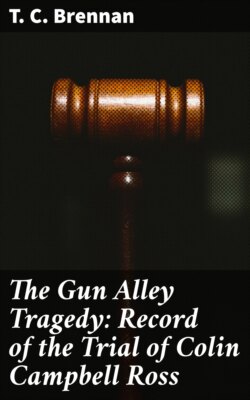Читать книгу The Gun Alley Tragedy: Record of the Trial of Colin Campbell Ross - T. C. Brennan - Страница 3
На сайте Литреса книга снята с продажи.
PREFACE.
ОглавлениеTable of Contents
No trial in Australian history has created such a public sensation as did the trial in Melbourne of Colin Campbell Ross for the murder of the little girl, Alma Tirtschke, on the afternoon of December 30th, 1921. It was presided over by Mr. Justice Schutt and lasted for more than five days. Mr. H. C. G. Macindoe conducted the case for the Crown and Mr. G. A. Maxwell appeared, with Mr. T. C. Brennan as junior, for the defence. For many reasons, it is desirable that the proceedings at the trial should be placed on record. It is not merely that the story itself—a veritable page out of real life—makes tragically interesting reading. The nature of the evidence was so unusual, and the character of the chief Crown witnesses was so remarkable, that it is entirely in the interests of justice that the whole proceedings should be reviewed in the calm light of day.
While the trial was on, and for weeks before it was on, anything in the nature of a dispassionate review was impossible. Public opinion was inflamed as it has not been inflamed within the memory of this generation. Ross was tried for his life in an atmosphere charged and overcharged with suspicion. Whether guilty or innocent, he entered the dock in circumstances under which few men are compelled to enter it. As everyone in Australia knows, he was condemned almost entirely on the strength of two confessions he was alleged to have made. It would probably be admitted that, in the absence of those alleged confessions—which he strenuously denied ever having made—no jury could have convicted him. It is doubtful, indeed, if without them there was a case for the jury. But did he actually say what either the woman Ivy Matthews or the man Harding declared he said? The verdict of the jury does not supply an answer. The question remains unanswered, and the doubt in regard to it constitutes the enduring mystery of the Ross trial.
All students of criminology—and all friends of truth—are under a debt of gratitude to Mr. Brennan for the cool, precise and perfectly dispassionate manner in which he has, inter alia, analysed the statements of these two people, Harding and Matthews. He has placed the salient features side by side. There seems no escape from the irresistible logic of his conclusion—that Matthews and Harding, knowing certain facts about Ross from an outside source, were compelled to fill in the gaps in their own way. They could not have been drawing from the one alleged source when they differed so absolutely as to the essential circumstances of the crime.
As Mr. Brennan points out, he is not undertaking to prove that Ross was innocent of the Gun Alley murder. Anyone who reads his closely reasoned pages can have little doubt that such is his opinion. But his task is simpler. It is to show that Ross should not have been convicted on the evidence, that the evidence for the Crown was, to a large extent, contradictory—far more so than in the heat and passion of the trial was allowed to appear. He is able to go even further than that, and to show that a great part of it, so far from being cumulative on other parts, as the jury may have naturally believed, was really destructive of those other parts.
He has performed his task with care and discretion. No one who reads Mr. Brennan’s review of the case can doubt that he has thrown off the role of advocate—ably as he sustained it at the trial and on the two appeals—and is only anxious to arrive at the truth. There should be no other desire in the minds of any reader; and the people of Australia, who cannot possibly have followed the case with the care that Mr. Brennan has followed it, will appreciate both the value of his work and the deep interest of the story that he tells. Whether they think the mystery of the Gun Alley murder was cleared up by the jury’s verdict, or whether it remains a mystery is for them to say.
A. J. BUCHANAN.
Selborne Chambers, Melbourne.
